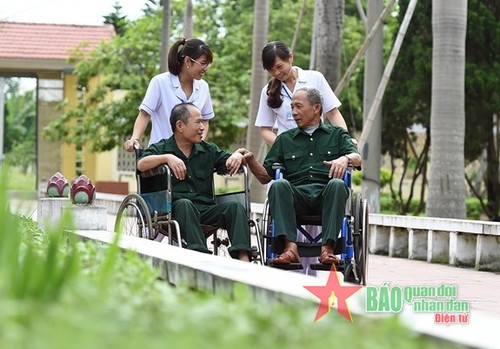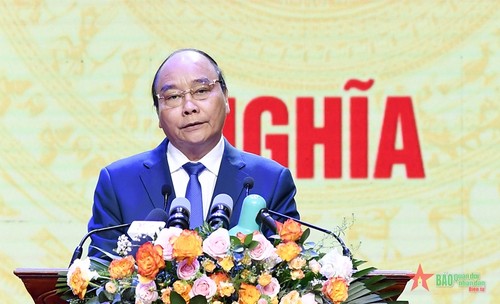 Taking care of seriously injured soldiers at Nho Quan sanatorium for sick soldiers in Ninh Binh province (Illustrative photo: Phu Son) Taking care of seriously injured soldiers at Nho Quan sanatorium for sick soldiers in Ninh Binh province (Illustrative photo: Phu Son) |
During half a century of fighting for national independence and reunification, more than a million Vietnamese soldiers laid down their lives. President Ho Chi Minh once said the blood of the martyrs made the revolutionary flag more brightly red. Their heroic sacrifices helped Vietnam win independence and freedom.
Policies for national contributors are fine-tuned
Since President Ho Chi Minh signed Decree No.20/SL on February 16, 1947 regulating pensions and allowances for injured and dead soldiers, his views on social welfare for war invalids and martyrs have been upheld by the Party and State and written in policies for war invalids, martyrs, and people with meritorious service to the revolution. Those policies have been implemented throughout Vietnam, raising public awareness of the importance of taking care of national contributors.
Over the intervening 75 years, incentives for revolutionary contributors and their families have been adjusted to match changing socio-economic conditions.
So far more than 9.2 million people with meritorious service, including senior revolutionaries, pre-insurrection cadres, Vietnamese Heroic Mothers, Heroes of the People's Armed Forces, Labor Heroes, war invalids, sick soldiers, and relatives of fallen soldiers have benefitted from preferential policies. Besides subsidies and allowances, the Party and State have also provided health care, land for production, home repairs, vocational training, and jobs.
Sanatoriums for national contributors have been upgraded. The Ministry of Labor, Invalids, and Social Affairs has submitted to the Prime Minister a proposal to set up a network of care facilities for people with meritorious service in the 2021-2030 period, with a vision to 2050. These facilities will be equipped to provide physical and mental care to people with meritorious service.
 President Nguyen Xuan Phuc (photo: qdnd.vn) President Nguyen Xuan Phuc (photo: qdnd.vn) |
President Nguyen Xuan Phuc said: “Over the last 75 years we have mobilized resources from the State and community to carry out meaningful programs such as charity houses, gratitude funds, savings books, and taking care of seriously wounded soldiers, lonely elderly parents of martyrs, orphans, and Vietnamese Heroic Mothers. These programs demonstrate the affection and responsibility of society, while "paying gratitude" programs have created social unity and strength and rekindled patriotism and great national unity.”
Public consensus to take care of national contributors
At meetings with national contributors to mark the 75th War Invalids and Martyrs Day, Party and State leaders emphasized that taking care of sick soldiers and families of martyrs is the responsibility of every sector and socio-political organization.
Ministry of Labor, Invalids, and Social Affairs Dao Ngoc Dung said: “Ministries and sectors continue to offer incentives to national contributors, particularly those in difficult circumstances, upgrade facilities, help them with vocational training and employment, and provide healthcare services to them and their families. We need to continue the search for and identification of martyrs' remains. Campaigns to pay gratitude to and take care of the families of invalids, martyrs, and people with meritorious service to the revolution should be expanded.”
Vietnam’s War Invalids and Martyrs Day embraces profound social significance. It is a way for the community and the State to demonstrate their respect for those who have sacrificed and devoted themselves to national independence, freedom, and unification.